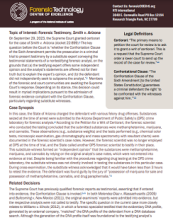Community courts
Criminal Justice Technology Adoption and Implementation Guide
Interactive Computer-Assisted Recovery Enabler (ICARE): Treatment Support Tool for Substance-Using Offenders, Final Technical Report
Dispensing Justice Locally
Bail, Bias and Bargaining: Investigating Racial Dynamics in Plea Negotiations across Local Court Communities
Procedural Justice in Jails
Topic of Interest: Forensic Testimony, Smith v. Arizona
NIJ Journal Issue No. 231
Desistance from Crime: Interventions to Help Promote Desistance and Reduce Recidivism
No single criminal justice agency can promote desistance on its own. Partnerships across state, local, and federal agencies — along with the support of family and community stakeholders — are instrumental in supporting desistance from crime and reducing recidivism.
Law enforcement, courts, corrections, and community supervision agencies play a key role in the desistance process and reducing recidivism.
See the YouTube Terms of Service and Google Privacy Policy
Criminal Justice Requirements and Resources Consortium
Intimate Partner Abuse Solution Programs: Identifying High-Priority Needs Within the Criminal Justice System for Programs Focused on Intimate Partner Violence Prevention
The North Carolina Youth Violence Prevention Center: Using a Multifaceted, Ecological Approach to Reduce Youth Violence in Impoverished, Rural Areas
Contextual Influences on the Sentencing of Individuals Convicted of Sexual Crimes
Community Court to Early Decision Court Revised Program Plan
Booker and Beyond Analyzing Sentencing Reform and Exploring New Research Directions
This webinar features a discussion of previously published research on the U.S. Supreme Court’s 2005 Booker decision - which effectively transformed the United States Sentencing Guidelines from a mandatory, to an advisory, system. The presentation will address selected research findings from the last 15 years. Individual participants will briefly review their previous research findings with particular attention paid to the analytic methods used.
See the YouTube Terms of Service and Google Privacy Policy
NIJ Multisite Impact and Cost-Efficiency Evaluation of Veterans Treatment Courts, Fiscal Year 2022
Deadline Notice
The deadline for the funding opportunity discussed in this video has passed.
See the YouTube Terms of Service and Google Privacy Policy



